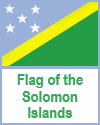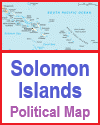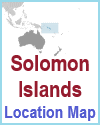The Solomon Islands, an archipelago of nearly 1,000 islands in the South Pacific Ocean, lie east of Papua New Guinea and northwest of Vanuatu. The nation spans a land area of approximately 28,400 square kilometers, with a population of around 700,000 people. Honiara, located on the island of Guadalcanal, serves as the capital and main economic center.
The Solomon Islands are known for their rich biodiversity, stunning landscapes, and cultural diversity. The islands boast dense rainforests, pristine beaches, and vibrant coral reefs, making them a haven for nature lovers and divers. The diverse population comprises primarily Melanesian people, with significant Polynesian and Micronesian minorities. Over 70 languages are spoken, reflecting the islands' cultural richness.
Economically, the Solomon Islands rely on agriculture, forestry, and fisheries. Key exports include timber, fish, copra, and palm oil. Recently, tourism has been growing, attracted by the islands' natural beauty and World War II historical sites, particularly the Battle of Guadalcanal.
Despite their natural wealth, the Solomon Islands face challenges such as political instability, economic dependency, and vulnerability to natural disasters like earthquakes and tsunamis. However, efforts are being made to promote sustainable development and environmental conservation, aiming to balance economic growth with the preservation of their unique ecosystems and cultural heritage.
|












